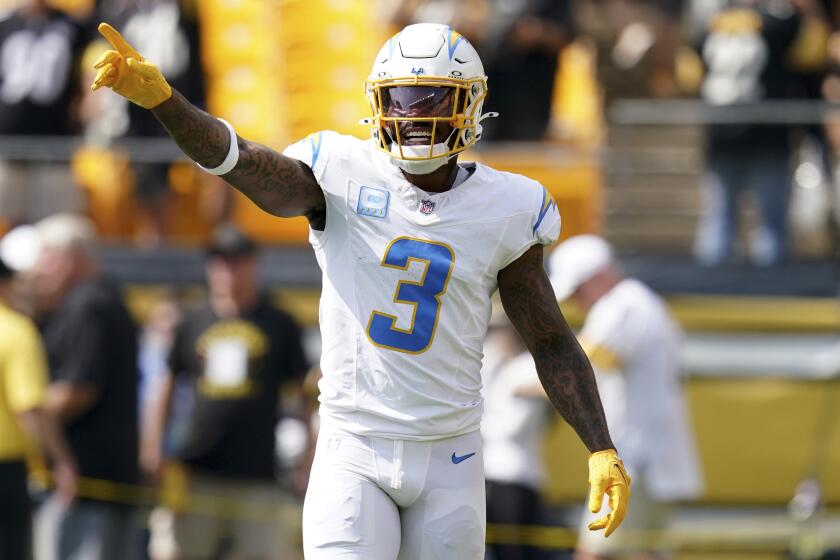Ultimate Glory Awaits Joe Morgan in the Hall
CINCINNATI â Joe Morgan knew how to pick his spots.
He wasnât the flashiest player on Cincinnatiâs Big Red Machine of the 1970s. Neither was he the best-known. But in the big moments, those that separate the good from the best, there was none better than the 5-foot-7 second baseman.
âHe was just a good major-league player when it didnât mean anything,â former manager Sparky Anderson said. âBut when it meant something, he was a Hall of Famer.â
The Baseball Writers Assn. of America agreed. Morgan was voted into the Hall of Fame this year on the first ballot, a tribute to his legacy of doing many things very well -- especially when glory was on the line.
He will be inducted on Sunday.
âHe did it all, and he did it all the time,â said catcher Johnny Bench, the first member of the Big Red Machine to enter the Hall of Fame. âI always thought that Joe was the best player I ever played with, and that takes in a lot of ground.â
âJoeâs the most intelligent player I ever played with,â Pete Rose said. âHe got the most out of his ability. He wasnât the biggest. He wasnât the strongest. He wasnât the fastest. But he got everything out of what he had. Just amazing.â
He wasnât the dominant personality on the Big Red Machine; Rose filled that bill. Bench supplied the teamâs muscle, and Tony Perez was the clutch RBI provider.
But Morgan could dominate a game with a blend of speed, power and defense that made him the Most Valuable Player on the Redsâ World Series champions of 1975-76.
âBench probably had the most raw baseball ability of any of us,â Morgan said. âPete obviously had the most determination to make himself the player he was. Perez was the unsung hero. I guess I was just a guy who could do a lot of things.â
His talent for picking his spots defined his career in two important ways: he came along when the game was moving to speed, and he blossomed at the right time -- surrounded by one of the best teams of all time.
He spent his first nine major-league seasons in Houston, and found the gameâs evolution to artificial surfaces -- first unveiled at the Astrodome -- made him a more dangerous player. He could turn singles into doubles, steal bases and take away hits with his speed.
âThatâs when the game went to more speed,â Rose said.
The Reds were looking for the last few pieces of to their championship puzzle, and thought Morganâs speed would balance their powerful lineup. He arrived on Riverfront Stadiumâs artificial turf for the 1972 season as part of an eight-player trade that sent Lee May and Tommy Helms to Houston.
His arrival marked the arrival of the Big Red Machine.
âJoe fit in with the rest of us like the missing link in the puzzle,â Rose said.
The 1975-76 seasons were his best of his 22-year career, making him one of just nine players to win consecutive MVP honors.
In 1975, Morgan hit .327 with 17 homers, 94 RBIs and 67 stolen bases, and drove in the winning run in the seventh game of the World Series with a two-out single in the ninth inning in Boston. He followed with a .320 average, 27 homers, 111 RBIs and 60 steals the next year, when the Reds proved themselves a dominant team.
His years with the Reds were his best. He won five Gold Glove awards from 1973-77 and was named an All-Star in every one of his year with the Reds (1972-79). He became only the fifth second baseman in National League history to drive in more than 100 runs in 1976.
They were already talking about the Hall of Fame.
âIn 1975, at the end of the season, Sparky came to me and said, âYouâre going to be the most valuable player in the league,ââ Morgan said. âAnd he said, âJoe, you need one of those to get into the Hall of Fame.â That was the first time I thought about going into the Hall of Fame.â
His numbers were never as impressive again. A series of injuries in the late 1970s hampered his production, and the Redsâ decision to dismantle their chapionship team made him look elsewhere.
When he left Cincinnati, he could still pick his spots. Morgan spent the 1980 season with Houston, helping the Astros win an NL West title. He spent two seasons with San Francisco, then was reunited with Rose and Perez in Philadelphia for a National League pennant in 1983. He retired after playing for Oakland in 1984.
He finished with a .271 lifetime average, 268 homers, 1,133 RBIs, 689 stolen bases and a reputation as one of the most dominant players of his time.
âThere havenât been too many players as good as Joe Morgan,â Rose said.
More to Read
Go beyond the scoreboard
Get the latest on L.A.'s teams in the daily Sports Report newsletter.
You may occasionally receive promotional content from the Los Angeles Times.










